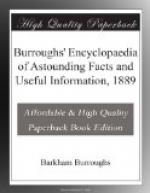SOME FAMOUS WAR SONGS.—The slavery war developed several Union song-writers whose stirring verses have kept on singing themselves since the close of that great struggle. Two among them are best remembered nowadays, both men who wrote the words and composed the music to their own verses. Chicago lays claim to one, Dr. George F. Root, and Boston to the other, Henry C. Work. The song “Marching Through Georgia,” as every one knows, was written in memory of Sherman’s famous march from Atlanta to the sea, and words and music were the composition of Henry C. Work, who died not many months ago (in 1884). The first stanza is as follows: Bring the good old bugle, boys, we’ll sing another song—Sing it with spirit that will start the world along—Sing it as we used to sing it, fifty thousand strong, While we were marching through Georgia.
Chorus—“Hurrah! hurrah! we bring the jubilee! Hurrah! hurrah! the flag that makes you free!” So we sang the chorus from Atlanta to the sea, While we were marching through Georgia.
Among the other songs of Work the following are best known: “Kingdom Coming,” or “Say, Darkey, Hab You Seen de Massa?” “Babylon is Fallen,” “Grafted into the Army” and “Corporal Schnapps.” This record would be incomplete were we to fail to mention some of the many ringing songs of George F. Root, songs which have made the name of Root famous in thousands upon thousands of households in the West. Some of these songs are: “Battle Cry of Freedom,” “Tramp, Tramp, Tramp,” “On, on, on, the Boys Came Marching,” “Just Before the Battle, Mother,” “Just After the Battle,” “Lay Me Down and Save the Flag,” “Stand Up for Uncle Sam, My Boys.” The well known song, “Wrap the Flag Around Me, Boys,” was composed by R. Stewart Taylor, and “When Johnny Cones Marching Home” by Louis Lambert.
THE COST OF ROYALTY IN ENGLAND.—Her Majesty:
Privy purse:
L60,000
Salaries of household: 131,260
Expenses of household: 172,500
Royal bounty, etc.: 13,200
Unappropriated: 8,040
_________
L385,000




